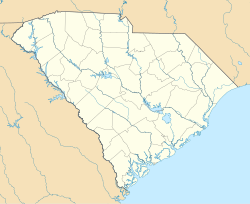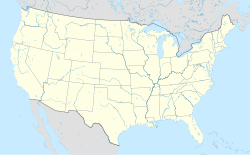Prince Frederick's Chapel Ruins
Prince Frederick's Chapel Ruins | |
Ruins at Prince Frederick's Chapel | |
| Location | Southeast of Plantersville on County Road 52, near Plantersville, South Carolina |
|---|---|
| Coordinates | 33°30′20″N 79°10′49″W / 33.50556°N 79.18028°W |
| Area | 1.5 acres (0.61 ha) |
| Built | 1859 |
| NRHP reference No. | 74001858[1] |
| Added to NRHP | August 28, 1974 |
Prince Frederick's Chapel Ruins is a historic site in Plantersville, South Carolina.[2][3]
The first church on this site, known as Prince Frederick's Chapel, Pee Dee, was built in 1848 on a site donated by the Rev. Hugh Fraser in 1834. Most of the parishioners were rice planters along the Pee Dee River. These ruins are of the second church here, approved by a committee of Robert Francis Withers Allston, Davison McDowell, and Francis Weston and begun in 1859 but interrupted by the Civil War.
The Gothic Revival church designed by Louis J. Barbot was completed in 1876 with a gift of $1,700 by John Earle Allston. With the decline of rice planting the church gradually fell into disrepair and was eventually deemed unsafe. It was demolished in 1966, leaving only the front wall and tower.
The ruins were listed in the National Register of Historic Places in 1974.[1]
References
[edit]- ^ a b "National Register Information System". National Register of Historic Places. National Park Service. March 13, 2009.
- ^ Myers, Florence; Kathy Kelly-Waccamaw (January 4, 1974). "Prince Frederick's Chapel Ruins" (pdf). National Register of Historic Places - Nomination and Inventory. Retrieved 7 July 2012.
- ^ "Prince Frederick's Chapel Ruins, Georgetown County (S.C. Sec. Rd. 52, Plantersville vicinity)". National Register Properties in South Carolina. South Carolina Department of Archives and History. Retrieved 7 July 2012.
External links
[edit]- Historic American Buildings Survey (HABS) No. SC-464, "Prince Frederick's Chapel (Ruins), U.S. Route 52, Plantersville, Georgetown County, SC", 3 photos, 1 photo caption page
- Historic American Buildings Survey in South Carolina
- Former Episcopal church buildings in South Carolina
- Churches on the National Register of Historic Places in South Carolina
- Churches completed in 1859
- 19th-century Episcopal church buildings
- National Register of Historic Places in Georgetown County, South Carolina
- Churches in Georgetown County, South Carolina
- Pee Dee South Carolina Registered Historic Place stubs
- South Carolina church stubs



